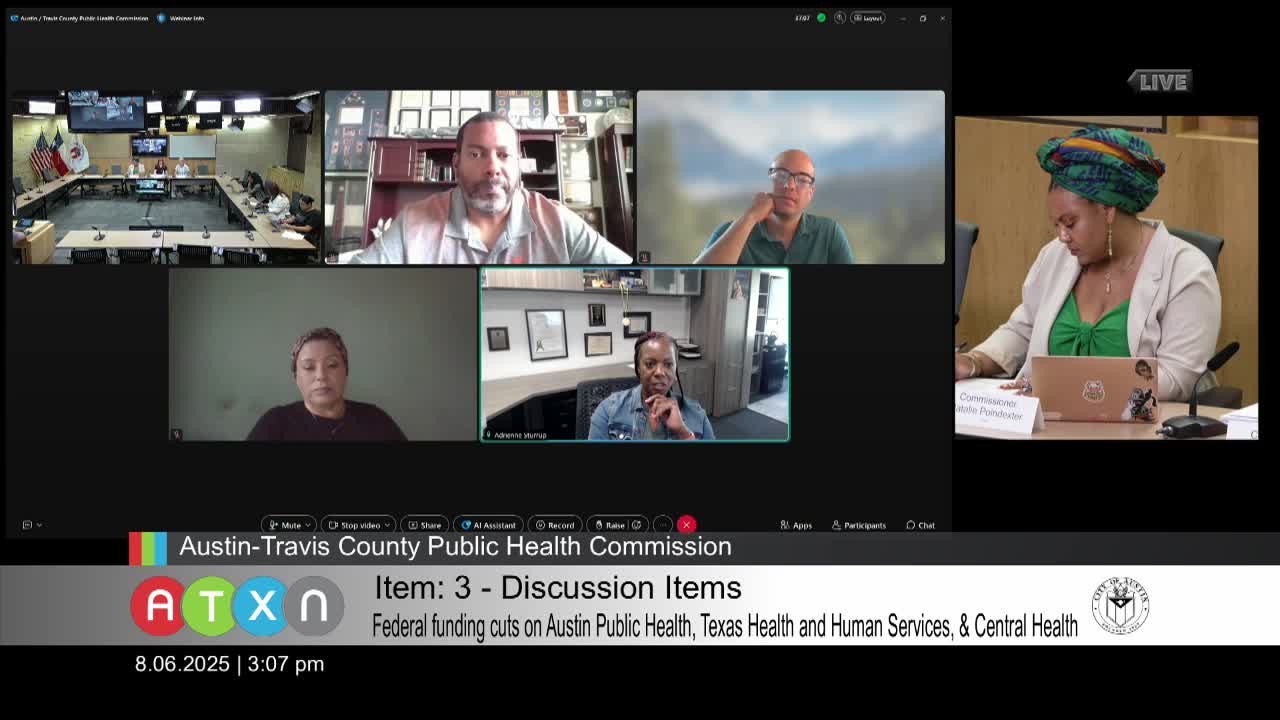Public Health Director Warns of Funding Crisis Impacting Services and Emergency Response
August 06, 2025 | Austin, Travis County, Texas
This article was created by AI summarizing key points discussed. AI makes mistakes, so for full details and context, please refer to the video of the full meeting. Please report any errors so we can fix them. Report an error »

In a recent meeting of the Austin Public Health Commission, officials voiced urgent concerns about the city's public health infrastructure and its ability to respond to emergencies. The discussion unfolded under the fluorescent lights of city hall, where the atmosphere was charged with a sense of urgency and responsibility.
Director Sturm highlighted the critical need for stable funding to maintain public health services, particularly in light of a looming $33 million budget deficit. "Without secure funding for public health infrastructure, you lose days, minutes, and hours in how we're able to respond," Sturm stated, emphasizing the potential consequences of inadequate resources during health crises. The director pointed out that the city’s ability to attract and retain skilled public health workers is at risk, particularly for those in grant-funded positions who are now seeking more stable employment.
The commission also discussed the potential of a tax rate election as a means to bolster public health funding. Sturm noted that while the Tax Rate Election (TRE) could provide some financial relief, it is just one of several options being explored to address the city's pressing health needs. The conversation underscored the interconnectedness of public health and social services, with Sturm stressing that funding cuts have already impacted vital outreach programs, such as HIV and STI testing services that previously reached underserved communities.
Commissioner Crookim echoed Sturm's sentiments, acknowledging the challenges faced by the department and the community. "We are grateful for other players in this space that provide those services, but there is a gap," Crookim remarked, highlighting the importance of a coordinated response to ensure community health.
As the meeting concluded, the commissioners were left contemplating the future of public health in Austin. The discussions revealed a clear message: the community must decide how to invest in its health infrastructure, as the consequences of inaction could be felt far and wide. The urgency of the situation calls for a collective effort to secure the necessary resources to protect the health and well-being of all Austin residents.
Director Sturm highlighted the critical need for stable funding to maintain public health services, particularly in light of a looming $33 million budget deficit. "Without secure funding for public health infrastructure, you lose days, minutes, and hours in how we're able to respond," Sturm stated, emphasizing the potential consequences of inadequate resources during health crises. The director pointed out that the city’s ability to attract and retain skilled public health workers is at risk, particularly for those in grant-funded positions who are now seeking more stable employment.
The commission also discussed the potential of a tax rate election as a means to bolster public health funding. Sturm noted that while the Tax Rate Election (TRE) could provide some financial relief, it is just one of several options being explored to address the city's pressing health needs. The conversation underscored the interconnectedness of public health and social services, with Sturm stressing that funding cuts have already impacted vital outreach programs, such as HIV and STI testing services that previously reached underserved communities.
Commissioner Crookim echoed Sturm's sentiments, acknowledging the challenges faced by the department and the community. "We are grateful for other players in this space that provide those services, but there is a gap," Crookim remarked, highlighting the importance of a coordinated response to ensure community health.
As the meeting concluded, the commissioners were left contemplating the future of public health in Austin. The discussions revealed a clear message: the community must decide how to invest in its health infrastructure, as the consequences of inaction could be felt far and wide. The urgency of the situation calls for a collective effort to secure the necessary resources to protect the health and well-being of all Austin residents.
View full meeting
This article is based on a recent meeting—watch the full video and explore the complete transcript for deeper insights into the discussion.
View full meeting
